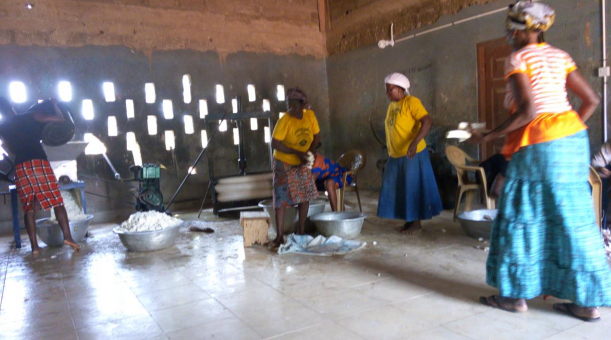
Manchie Women gari processors working in a smoke-free environment using Improved LPG Stoves provided by AWDF/20/05/11
By Rose Buabeng, AWDF
05/06/2019
Since inception, the African Women’s Development Fund (AWDF) has invested in and supported several women agro-processing groups to improve their production processes into more energy efficient systems.
With a global focus on air pollution for this year’s World Environment Day, this article seeks to highlight the activities of rural women agro-processors and how these activities impact the environment and their health.
A large number of rural women in Africa are engaged in agro processing cottage industries, and most of them use solid fuels in their production processes, creating environmental risks which could have significant impact on their health and wellbeing. The burden from solid fuels disease remains most prominent in areas with limited access to clean fuels, mostly poor households in developing countries. Globally, 2.6% of all ill-health is attributable to indoor smoke from solid fuels, nearly all of this in poorer regions.
With this in mind, AWDF has partnered the women’s groups to boost their incomes and to move into more eco-friendly models that will protect not only their health but the environment in general.
Some of these groups are involved in gari processing, groundnut paste and oil processing, shea butter processing, brewing of local beer, etc. AWDF has supported such women groups with modern processing equipment, processing structures as well as clean and more efficient energy source (LPG). The groups have also received capacity building support in health, hygiene and safety with some being able to certify their production activities with quality and standards regulatory bodies within their countries.
A typical example is the Manchie Women Food Processing and Marketing Group in Ghana. Since 2008, AWDF has provided support to the tune of $100,000 to provide modernised cassava processing equipment, clean and efficient energy sources, health and hygiene capacity support, marketing and financial management support. This has enabled the women processors to produce in a pollution-free environment; expand marketing channels and increase income levels. The support has also given them credibility in the district; they are contacted or invited to participate in all development and leadership activities in the Amasaman District in the Greater Accra Region of Ghana.
Solid fuels will continue to remain the main source of household fuel in developing countries for the foreseeable future but collective effort must be made to scale down on its use and move into sustainable and environmentally friendly energy sources.

Manchie Women gari processors using Improved processing equipment provided by AWDF/20/05/11
